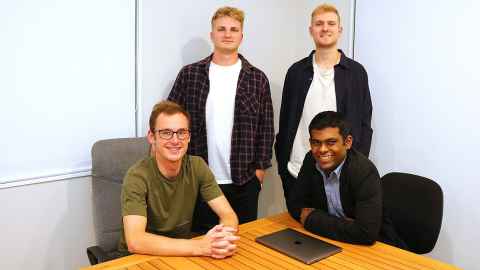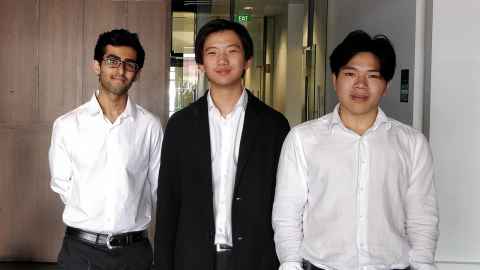Student software ideas to be showcased on the world stage
21 May 2018
Students found success in combining engineering and entrepreneurship at the Microsoft Imagine Cup.

Three New Zealand teams that recently competed in Melbourne have made it to the finals of the Microsoft Imagine Cup, a prestigious technology and entrepreneurship competition. The finals will be held in Seattle in July, and boasts a US$100,000US top prize alongside opportunities to tour Microsoft’s offices and be mentored by global experts. The Faculty of Engineering is set to be well-represented in the competition, with our students in two of the competing teams.
Helping musicians hack the industry
Rivindu Weeraskera, a PhD candidate in Computer Systems Engineering, along with Commerce student Benjamin Sweney and Commerce and Law Students Matt Bastion and Ryan Howlett, see the Imagine Cup as an opportunity to prove their credibility; it’s an endorsement of their technology.
The team is responsible for Hypebeat, a platform that helps musicians unlock strategies to drive their growth, grow their fanbase, or draw crowds to shows in different locations. According to Rivindu, they’ve determined that “exposure is entirely separate to the quality of an artist’s music. A number of musicians don’t include New Zealand in their tours because they think they don’t have enough fans here. This includes even well-known international artists.”
This means that they had a distinctive problem to solve. “Making it is incredibly complicated with digital music and social media. Strategies that work for one musician in a specific genre and location won’t necessarily work for another. Musicians are already excellent at creating great content and music, but they often need help to leverage that. Hypebeat has never been about changing what they do, but showing the best way to do it”, says Matt.
In analysing a user’s actions alongside those of related artists, the Hypebeat platform shows how different strategies perform in different locations. This enables Hypebeat to understand and recommend what works both at a broad strategy level and when suggesting more granular actions such as how and why to target a specific demographic on a particular platform in a new location. Matt believes that they’re “the only ones using technology to help musicians find their fans rather than helping the audience find great music. Some of the greatest musicians are never discovered, and that’s not because of their music – they often have passionate fans.”
An intensive research process was necessary for Hypebeat to work, partly supported by their own experiences. Each team member has been learning from musicians in their disparate networks – coming from different parts of the country and having separate personal networks was crucial to their large sample size. They also “shamelessly talked to musicians whilst competing in Melbourne”, upping their data sample from 200 musicians to around 2,000 within a short timeframe.
Further developments will include a mobile app and customisation for different locations. However for now, they are focused on functionalities that are crucial to Hypebeat’s first publicly available product. Rivindu states that have expanded their conversations with musicians and managers to everyone involved in the industry, including labels, tech companies and marketers, and are training their algorithms by using “everyone that’s ever featured on a New Zealand, Australian or global chart, either virally or otherwise”.
Coming from diverse academic backgrounds has been beneficial to the team, suggesting that they have an appreciation for various disciplines, and share a common vision that the Imagine Cup is just one of many steps towards their passion project. Matt states, “it seems that can happen once you make it to Seattle; you’d be practically on the world stage from day one, which is perfect because we’re really building something to help artists on a global scale and break into different markets. The prize money would be pretty good too!”
A local solution to carpooling

Our other University competitors in Melbourne were a team of undergraduate Software Engineering students. Sukhans Asrani, Andrew Hu and Winston Zhao have put in long days to rush out the prototype for their app, UniRide.
UniRide is a ridesharing application aimed at offering a solution to the lack of user-friendly carpooling initiatives and apps in New Zealand. Andrew suggests, “carpooling with strangers involves being in closer proximity than public transport, creating awkwardness and safety considerations that some people can be uncomfortable with. We’re trying to resolve this hesitance by adding a safe but social element, utilising connections already available via Facebook such as friends and mutual friends”.
According to Winston, inspiration came from the problems they saw in their own personal lives. “One of my close friends realised that a classmate has been complaining about the time it takes to get into uni on Fridays when there’s been a spare seat in his car this entire time. We realised that it isn’t always easy to know where potential carpools are beyond your closest friends, so this has potential to help students save time and money, while also having fun and expanding their social circles.”
They see plenty of room for future expansions, such as using student timetables and study details (such as cohorts and degrees) to generate compatibility scores so users can find likeminded people, as well as adding new factors for selecting carpools.
“We’re focusing here on our own student community first, because we know the market and how to advertise to them. We’re satisfying the need for places with a large urban sprawl like Auckland, but we also like to think about how the app can someday have an impact on the environment by encouraging students to use fewer parking spots and reducing their carbon footprint. We’re just starting small”, says Winston.
The three met at high school through their mutual interest in programming. Studying here gave them the benefit of formal learning, Winston believes that they have gained “skills that are central to a theory itself that’ll help you create better products – this goes beyond picking up random knowledge”. As Software Engineering students, they also saw the benefit of a specialisation with a very talented cohort. “You’re pushed to work harder, because you want to keep up with your peers”.
Like many other participants, Andrew is looking forward to touring Microsoft, but he is particularly interested in “seeing other teams tackling issues specific to their side of the world. We’re trying to solve problems with public transport, for example. One of the cool things about this is the global perspective we’re about to gain”. Sukhans agrees, adding that, “some of the previous winners are possibly the smartest people of our generation. Just being in the same room as them would be an honour.”
Hypebeat is currently seeking more musicians and music industry professionals to get involved. You can find out more, or provide feedback via their website or Facebook page.
More information on UniRide is available on their website.